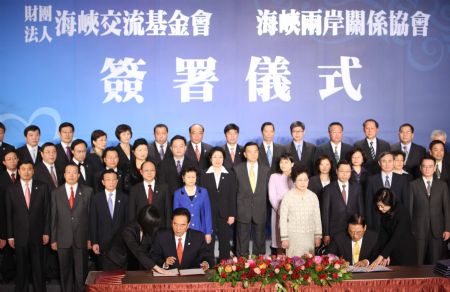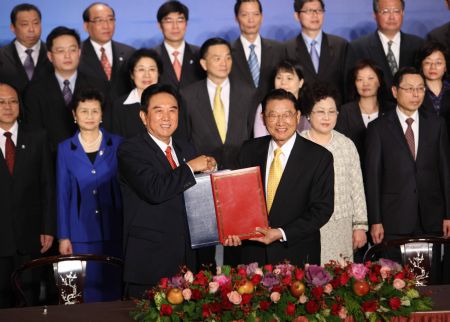
Chen Yunlin (L, front), president of the mainland's Association for Relations Across the Taiwan Straits (ARATS), and Chiang Pin-kung (R, front), chairman of Taiwan's Straits Exchange Foundation (SEF), sign agreements in Taichung, southeast China's Taiwan, Dec. 22, 2009. Chinese mainland and Taiwan negotiators reached three agreements on fishing, farm produce and standards measuring on Tuesday.(Xinhua/Yuan Man)
TAICHUNG, Dec. 22 (Xinhua) -- Chinese mainland and Taiwan negotiators Tuesday agreed to cooperate in farm produce quarantine and cross-Strait employment of fishermen, as well as to deal with different product quality standards.
Three agreements were reached at the talks between the mainland's Association for Relations Across the Taiwan Straits (ARATS) and Taiwan's Straits Exchange Foundation (SEF), which handle cross-Strait issues on behalf of their respective authorities.

Chen Yunlin (L, front), president of the mainland's Association for Relations Across the Taiwan Straits (ARATS), and Chiang Pin-kung (R, front), chairman of Taiwan's Straits Exchange Foundation (SEF), exchange agreements in Taichung, southeast China's Taiwan, Dec. 22, 2009.(Xinhua/Yuan Man)
Experts from both the mainland and Taiwan hailed the latest agreements as a move forward in clearing obstacles and facilitating cross-Strait economic and trade partnership.
The ARATS and SEF talks, the fourth round since they resumed negotiations in June last year after a 10-year suspension, began Tuesday morning.
FARM PRODUCE
Under the pact on farm produce quarantine, the two sides agreed to deal with the difference of food safety standards and set up a mechanism to cope with farm produce quarantine emergencies.
They promised "prompt information sharing, quick investigation and assistance to each other" in case of emergencies.
The mainland and Taiwan will inform each other of epidemic outbreaks related to farm produce and report regularly on safety problems found in farm produce exports and imports, such as toxic substances and harmful infestations.
They will also set up a system to trace farm produce quality across the Strait, which means Taiwan would assist mainland importers to investigate production and processing of its farm produce and vice versa.
Both sides will ease quarantine measures on produce that pass investigations, according to the pact.
Farm produce, especially fruit, is an increasingly important part of cross-Strait trade. Many Taiwan farmers and agriculture firms are investing in the mainland.
Hua Xiaohong, director of the Research Center of Taiwan, Hong Kong and Macao Economic Studies in the Beijing-based University of International Business and Economics, said the agreement would further facilitate the cross-Strait trade of farm produce.
"The mainland has adopted lots of preferential policies towards agricultural imports from Taiwan over the years. This agreement is another remarkable step in normalizing agricultural trade between the mainland and Taiwan," Hua said.
STANDARDS MEASURING
The ARATS and the SEF signed the agreement on the cooperation in standards measuring, inspection and certification in a bid to facilitate economic and trade contacts and improve the safety and quality of trade products.
It was hoped that the agreement would improve cross-Strait industrial cooperation, create a favorable investment environment and protect rights of consumers on both sides.
Under the agreement, the two sides agreed to work together on the establishment of common standards in key areas and construction of an information platform to share standards. Cooperation in legal measurement and information exchanges in measuring techniques and control would also be strengthened.
The two sides will carry out technical cooperation in inspection and measuring of product safety, and promote the establishment and implementation of certification and accreditation systems in new areas.
The two sides will establish a bulletin system of goods safety information and intensify communication and coordination on handling unqualified goods.
They will set up a special working group separately to decide concrete plans and further cooperation, according to the agreement.
Zhang Guanhua, deputy director of the Institute of Taiwan Studies, Chinese Academy of Social Sciences, said the agreement would be an important basic mechanism for the two sides to deepen economic contacts and cooperation.
"Enterprises on both sides will be more competitive, if the mainland and Taiwan can work out common standards for emerging industries such as photovoltaic and LED (Lighting Emitting Diode) and make the standards internationally accepted," Zhang said.
FISHERMEN EMPLOYMENT
With an agreement signed after the talks, Taiwan fishing boat owners can hire people from the mainland to engage in offshore and deep-sea fishing and vice versa.
Crew of the same rank on board the same fishing boats from both the mainland and Taiwan are entitled to the same payment and labor protection measures, according to the pact.
Both sides agreed to respectively establish a system to allow fishing boat owners and crew file complaints and set up a mechanism to settle disputes on labor cooperation as well as guide business entities to settle labor disputes and emergencies.
The mainland and Taiwan will inform each other massive safety emergencies in a timely manner, jointly adopt measures to settle emergencies and severely punish business entities that violate the pact, it said.
The two sides also agreed to evaluate the execution of the pact regularly through work meetings and exchange of visits.
"Under the agreement, there will be much fewer unnecessary conflicts in cross-Strait fishermen employment. It's a win-win agreement for mainland fishermen and Taiwan ship owners," said Pan Hsi-tang, a professor from Taiwan-based Tamkang University.
All the three agreements are supposed to take effect within 90 days after they are signed.